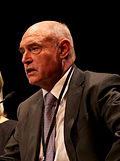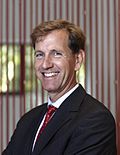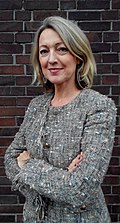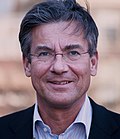| Part of the Politics series |
| Politics of the Netherlands |
|---|
 |
| Constitution |
| Monarchy |
| Cabinet |
| States General |
| Judiciary |
| Elections |
| Local government |
| Foreign relations |
| Related topics |
|
|
The Social and Economic Council (Dutch: Sociaal-Economische Raad, SER) is a major economic advisory council to the cabinet of the Netherlands. Formally it heads a system of sector-based regulatory organisations. It represents the social partners trade unions and employers' organisations. It forms the core organisation of the corporatist and social market economy known as the polder model and the main platform for social dialogue.
History
The SER was founded in 1950. It was founded after a long debate about the economic order of the Netherlands. The two main governing parties of the time, the Catholic People's Party (KVP) and the Labour Party (PvdA) had differing opinions on the subject. Both wanted to prevent the repetition of the Great Depression. The Labour Party preferred to grant the government an important regulatory role in the economy, while the KVP preferred to rely on the workings of a self-regulating market economy. A compromise was found in the corporatist model, in which both trade unions and employers' organisations would form sector-based regulatory organisations. The SER headed this structure and served as important partner for the national government. The SER was very important in the reconstruction of the Netherlands after the World War II.
In the 1950s and 60s, the SER was particularly successful in ensuring economic growth through close cooperation between government, trade unions and employers' organisations. In the 1970s, because of rising political polarisation and the 1973 oil crisis, the SER was unable to resolve economic problems. In the 1980s the SER returned to the centre of the economic policy making, as it was the platform for dialogue between the government and its social partners. In the 1990s, the role of the SER began to change. The role of the sector-based regulatory organisations began to decline and the SER increasingly took the role of an advisory council of government; in 1997 the Senate and House of Representatives were granted the right to submit enquiry commissions to the SER.
Goals
The SER has three main goals for Dutch social-economic policy:
- To promote balanced and sustainable economic growth;
- To promote full employment;
- To promote a fair income distribution.
Organisation

The SER has thirty-three members. It consists of three sections, which each have eleven members in the council. These sections are trade unions, employers' organisations and government-appointed members, the so-called Crown members. The trade union members are appointed from the three major unions: FNV (8), CNV (2) and the MHP (1). The members of the employers' organisations are representatives from the three major employers' organisations: VNO-NCW (7), MKB (3) and the LTO (1). The government-appointed members are normally professors of economics or related fields and they include representatives of the Bureau for Economic Policy Analysis (CPB) and the central bank, De Nederlandsche Bank. The board of the SER is formed by four members of each section. The chair of the organisation is always a government appointee.
The SER heads and oversees the system of sector-based regulatory organisations. These organisations can like other governments, provinces, water boards etc. enforce legislation for their members, in this case companies. The SER is financed by levies which companies pay to the chambers of commerce. It spends €14 million a year.
Activities
The group has negotiated among other things, agreements in the textile sector, the banking sector and the gold sector. The SER also performs legal and administrative tasks. For example in the field of employee participation, healthy and safe working, employment inspections and pensions.
List of chairs of the Social and Economic Council
| Portrait | Name | Term of office | Previous experience | Party | ||
|---|---|---|---|---|---|---|

|
Dr. Frans de Vries (1884–1958) |
1 June 1950 – 15 June 1958 (8 years, 14 days) |
Professor of Economics at the Erasmus University Rotterdam (1918–1945) Rector Magnificus of the Erasmus University Rotterdam (1921–1922, 1928–1929, 1935–1936) Professor of Economics at the University of Amsterdam (1945–1954) |
Independent | ||
| Vacant 15 June 1958 – 1 July 1958 | ||||||

|
Dr. Gerard Verrijn Stuart (1893–1969) |
1 July 1958 – 1 May 1964 (5 years, 305 days) |
Professor of Economics at the University of Amsterdam (1952–1962) |
Independent | ||

|
Jan de Pous (1920–1996) |
1 May 1964 – 1 February 1985 (20 years, 276 days) |
Minister of Economic Affairs (1959–1963) Member of the Council of State (1958–1959) |
Christian Historical Union (1964–1980) | ||
| Christian Democratic Appeal (1980–1985) | ||||||

|
Dr. Theo Quené (1930–2011) |
1 February 1985 – 1 January 1996 (10 years, 334 days) |
Director of the Scientific Council for Government Policy (1978–1985) |
Labour Party | ||

|
Klaas de Vries (born 1943) |
1 January 1996 – 3 August 1998 (2 years, 214 days) |
Member of the House of Representatives (1973–1988) |
Labour Party | ||
| Vacant 3 August 1998 – 1 January 1999 | ||||||

|
Dr. Herman Wijffels (born 1942) |
1 January 1999 – 1 April 2006 (7 years, 90 days) |
CEO and Chairman of the Rabobank (1986–1999) |
Christian Democratic Appeal | ||

|
Dr. Alexander Rinnooy Kan (born 1949) |
1 April 2006 – 1 September 2012 (6 years, 164 days) |
Member of the Social and Economic Council (1991–1996) Chairman of VNO-NCW (1991–1996) |
Democrats 66 | ||

|
Wiebe Draijer (born 1965) |
1 September 2012 – 10 September 2014 (2 years, 9 days) |
CEO and Chairman of the McKinsey & Company Netherlands (2003–2012) |
Independent | ||

|
Mariëtte Hamer (born 1958) |
10 September 2014 – 1 April 2022 (7 years, 203 days) |
Member of the House of Representatives (1998–2014) |
Labour Party | ||
| Vacant 1 April 2022 – 16 September 2022 | ||||||

|
Kim Putters (born 1973) |
16 September 2022 – Incumbent (2 years, 124 days) |
Member of the Senate (2003–2013) Chairman of The Netherlands Institute for Social Research (2013–2022) |
Labour Party | ||
Current Members of the Social and Economic Council
Appointed Members of the Social and Economic Council
| Appointed Members | |||||||||||
|---|---|---|---|---|---|---|---|---|---|---|---|
| Member | Appointed | Other function(s) | Member | Appointed | Other function(s) | ||||||

|
Mariëtte Hamer (born 1958) |
10 September 2014 (10 years, 130 days) |
Dr. Pieter Hasekamp (born 1965) |
1 March 2020 (4 years, 323 days) |
Director of the Bureau for Economic Policy Analysis | ||||||
| Luce van Kempen (born 1995) |
1 April 2020 (4 years, 292 days) |
Chairwoman of the Youth Council |
Dr. Romke van der Veen (born 1958) |
1 April 2012 (12 years, 292 days) |
Professor of Social and Behavioral Sciences Erasmus University Rotterdam | ||||||
| Dr. Evert Verhulp (born 1960) |
1 April 2012 (12 years, 292 days) |
Professor of Labour Law University of Amsterdam |

|
Dr. Kim Putters (born 1973) |
1 February 2017 (7 years, 352 days) |
Professor of Healthcare Management Erasmus University Rotterdam Director of the Institute for Social Research | |||||

|
Ed Nijpels (born 1950) |
15 August 2014 (10 years, 156 days) |
Chairman of the Climate Council Chairman of the Environment Central Foundation |
Dr. Geert ten Dam (born 1958) |
10 December 2015 (9 years, 39 days) |
Professor of Pedagogy Free University Amsterdam President of the Council of the University of Amsterdam | |||||
| Dr. Maarten Lindeboom (born 1960) |
1 September 2018 (6 years, 139 days) |
Professor of Economics Free University Amsterdam |
Femke Laagland (born 1979) |
1 July 2020 (6 years, 139 days) |
Professor of Labour Law Radboud University Nijmegen | ||||||
| Dr. Olaf Sleijpen (born 1975) |
1 April 2020 (4 years, 292 days) |
Chief Financial Officer De Nederlandsche Bank | |||||||||
Trade associations Members of the Social and Economic Council
| Trade Associations Members | |||||||||||
|---|---|---|---|---|---|---|---|---|---|---|---|
| Member | Appointed | Represents | Member | Appointed | Represents | ||||||

|
Hans de Boer (born 1955) |
1 July 2014 (10 years, 231 days) |
Industry and Employers Confederation |
Jacco Vonhof (born 1970) |
1 August 2018 (10 years, 170 days) |
Small and Medium- Sized Association | |||||
| Patricia Hoogstraaten (born 1959) |
1 May 2006 (18 years, 262 days) |
Retail Association |

|
Guido van Woerkom (born 1955) |
1 October 2013 (11 years, 109 days) |
Travelers Association | |||||
| Chris Buijink (born 1954) |
1 June 2013 (11 years, 231 days) |
Banking Association |
Dirk Beljaarts (born 1978) |
1 January 2019 (6 years, 17 days) |
Hospitality Association | ||||||
| Fried Kaanen (born 1955) |
1 April 2017 (7 years, 292 days) |
Manufacturing Association |
Niels Louwaars (born 1958) |
10 December 2019 (5 years, 39 days) |
Horticulture Association | ||||||
| Roderik Pape (born 1969) |
1 April 2020 (4 years, 292 days) |
Freelancers Association |
Hans van Waayenburg (born 1957) |
15 February 2019 (5 years, 338 days) |
CEO of Capgemini Netherlands | ||||||
| Deputy Trade Associations Members | |||||||||||
| Member | Appointed | Represents | Member | Appointed | Represents | ||||||

|
Ineke Dezentjé Hamming-Bluemink (born 1954) |
1 January 2012 (13 years, 17 days) |
Technology Industry Association |

|
Henk Kamp (born 1952) |
1 February 2018 (6 years, 352 days) |
Healthcare Providers Association | ||||

|
Ad Melkert (born 1956) |
1 April 2019 (5 years, 292 days) |
Hospitals Association |

|
Maxime Verhagen (born 1956) |
1 October 2015 (9 years, 109 days) |
Construction Association | ||||
| Richard Weurding (born 1961) |
1 April 2006 (18 years, 292 days) |
Insurance Association |
Leendert-Jan Visser (born 1971) |
1 April 2020 (4 years, 292 days) |
Small and Medium- Sized Association | ||||||
| Elisabeth Post (born 1965) |
1 June 2019 (5 years, 231 days) |
Transport Association |
Henk den Boer (born 1963) |
1 April 2020 (4 years, 292 days) |
Maintenance Association | ||||||
Trade union Members of the Social and Economic Council
| Trade union Members | |||||||||||
|---|---|---|---|---|---|---|---|---|---|---|---|
| Member | Appointed | Represents | Member | Appointed | Represents | ||||||

|
Han Busker (born 1955) |
1 May 2016 (8 years, 262 days) |
Federation of Trade Unions | Willem Jelle Berg (born 1969) |
1 April 2014 (10 years, 292 days) |
National Federation of Christian Trade Unions | |||||
| Nic van Holstein (born 1963) |
1 September 2015 (9 years, 125 days) |
Trade Union of Professionals |
Gerrit van de Kamp (born 1964) |
1 April 2019 (5 years, 292 days) |
Police Trade Union | ||||||
| Jan de Jong (born 1955) |
1 August 2016 (8 years, 170 days) |
Federation of Trade Unions for Seniors |
Bas van Weegberg (born 1996) |
1 Juli 2019 (5 years, 201 days) |
Federation of Trade Unions for Youth | ||||||
| Arend van Wijngaarden (born 1954) |
1 November 2012 (12 years, 78 days) |
National Federation of Christian Trade Unions |
Zakaria Boufangacha (born 1973) |
1 July 2017 (8 years, 262 days) |
Federation of Trade Unions | ||||||
| Tuur Elzinga (born 1965) |
1 July 2017 (7 years, 231 days) |
Federation of Trade Unions | Kitty Jong (born 1961) |
1 July 2017 (7 years, 231 days) |
Federation of Trade Unions | ||||||
| Judy Hoffer (born 1970) |
1 March 2019 (5 years, 323 days) |
Federation of Trade Unions | |||||||||
See also
External links
Categories:- 1950 establishments in the Netherlands
- Business organisations based in the Netherlands
- Dutch financial advisors
- Dutch political institutions
- Dutch trade association executives
- Dutch trade union leaders
- Economy of the Netherlands
- Government agencies established in 1950
- Government-related professional associations
- Labor in the Netherlands
- Members of the Social and Economic Council
- Non-profit organisations based in the Netherlands
- Industry in the Netherlands
- Think tanks established in 1950
- Think tanks based in the Netherlands
- Scientific organizations established in 1950
- Welfare in the Netherlands